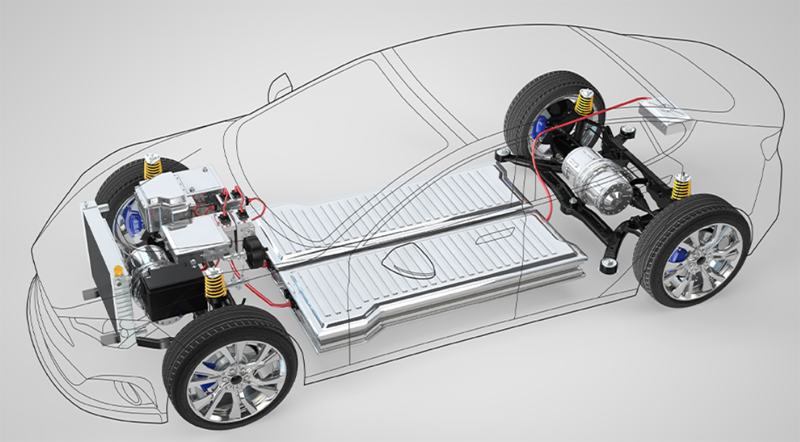
Here’s what you need to know about the electric powertrain. How it is making a surge in the automobile industries. The use of electric powertrain in electric vehicles increasing its popularity and is rapidly evolving. Since electric vehicles are eco-friendly and sustainable to use, the government supporting the service providers and such automobile industries with favorable policies. Due to growing concern for environmental pollution and minimizing the dependency of fossil fuel increasing the demand for electric vehicles. The manufacturer of the components of the electric powertrain is looking for a production cost-effective and efficient battery system so as to meet the growing need in automobile industries.
Electric Powertrains are a set of components that are installed in an electric vehicle that generates power to drive that vehicle. As compared to internal combustion engines, electric powertrain consists of a fewer number of components.
The main core components of Electric Powertrain are battery pack, DC-AC converter, electric motor, onboard charger. Functions that each component perform:
Apart from the core parts, there are many hardware and software components in electric powertrain. Electronic Control Units (ECUs) are software programs that are integrated into electric powertrain that exchange data and process it. There are many small ECUs installed that carry out a specific function. Some of them are as follows:
Battery management system - it is responsible for monitoring and maintaining the proper state of the battery.it takes care of battery efficiencies.
Thermal management system (BMS) - maintains the optimum temperature in the electric powertrain such that all the components operate properly.
Body control module (BCM) - it is responsible for controlling the functions of other electronic accessories like power windows, vehicle access control, mirror, etc.
Depending on type Electric Powertrain used, Electric vehicles are categorized into four that are
Battery-powered electric vehicle (BEV) - this type of vehicles simply depends on battery and motor as the source of power. There is no emission and hence are eco-friendly. But the battery pack in the electric powertrain are more in number. Since the driving system is motor of the powertrain therefore they are simpler than other electric vehicles.
Fuel cell electric vehicle (FCEV) - in this type of vehicle, chemical energy is converted into electrical energy. The energy is generated through hydrogen-oxygen reactions.
Plug-in hybrid electric vehicle (PHEV) – it is a type of hybrid vehicle that can be charged by any external sources. When the battery gets exhausted, it switches to engine driving.
Hybrid electric vehicle (HEV) – these vehicles are called so because it can use two or more sources for power generation. The driving force is mainly acquired by motor and engines but alternatively, fuel engines and a combination of gasoline and diesel can also be used. It is of two types series and parallel.
The lithium batteries are provided with electric double-layered capacitors used in the Electric Powertrains. This addition of the capacitor is expected to enhance the lifespan of the battery and will reduce the environmental issues. It also improves the energy density of the lithium-ion battery. Since electric vehicles installed with Electric Powertrain, it mainly depends on the battery and motor. Improvement in the battery management and cooling system will result in the advancement in the Electric Powertrain.
Electric vehicles' services mainly depend on the performance of Electric Powertrain. It is eco-friendly produces less noise and no emission of pollutants. So electric vehicles have minimal impact on the environment and are sustainable. It is much better than internal combustion engines. Electric powertrain decreasing the dependency on fossil fuel for transport services.
The high cost of the electrical components is a major challenge for Electric Powertrain. The popularity of electric vehicles is growing and yet has not attained much. Due to this factor, there is a lack of standardized charging infrastructure. The major factor is the cost of electric vehicles. At the same time, there are strict regulations for the installation of charging stations, which is putting an extra challenge for the service owner. Most of the users are concerned with the mileage given by vehicles in a single charge and that totally depends on the efficiency of the battery.
The electric powertrain Market has been witnessing rapid growth due to the increasing demand for electric vehicles. People are more concerned about environmental pollution. The awareness among people tending to opt for electric vehicles. In fact, governments of many developed and developing countries are providing favorable policies to encourage the service provider to manufacture and sell electric vehicles. These are the driving factors for the increasing popularity and demand for electric powertrain Market.
The strict rules for the installation of charging stations are limiting its growth, hopefully, some more flexible rules will be implemented by the governments in the coming years. The rising growth of logistics shared mobility, and e-commerce will drive the electric powertrain Market in the coming years. The Global Electric Powertrain Market has been anticipated to rise at a growth rate of 14.3% CAGR over the forecast period.